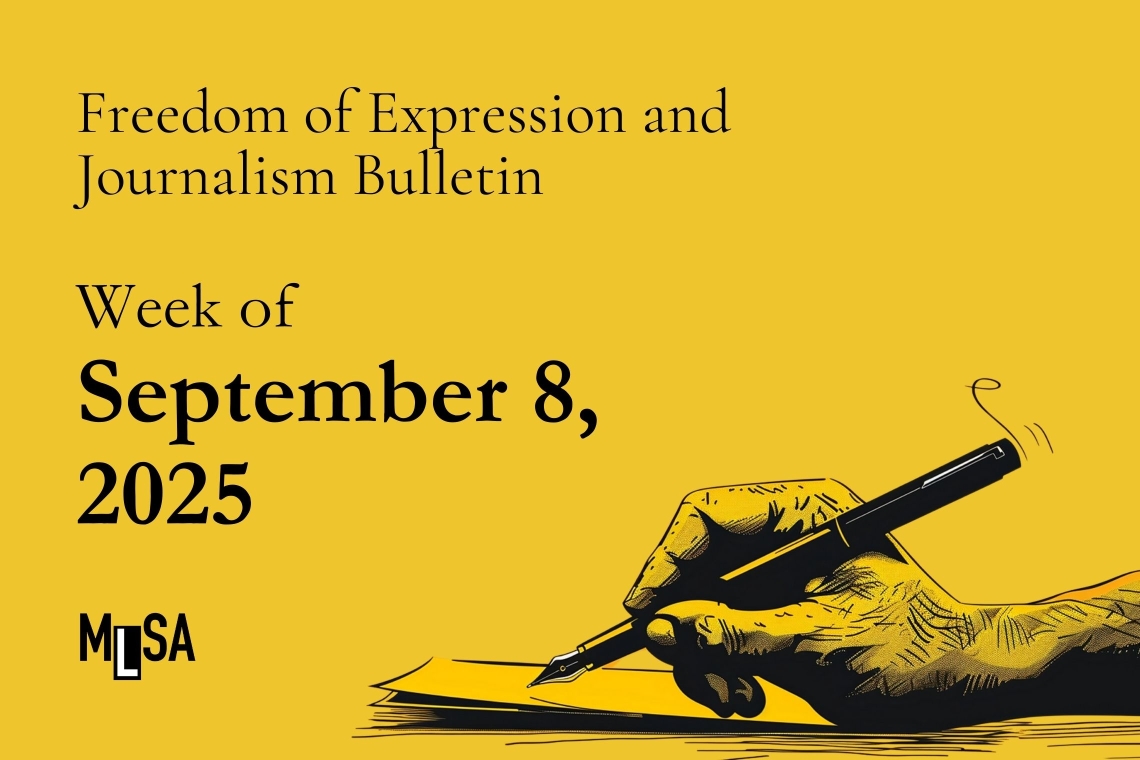The week of September 8, marking the reopening of the judicial year in Turkey, brought renewed scrutiny on journalism and freedom of expression. Legal proceedings against journalists and lawyers continued, while social media restrictions, courtroom developments, and physical attacks on reporters drew widespread attention. The week also saw new indictments, releases from prison, and persistent calls for the release of detained journalist Furkan Karabay, who has now spent 122 days behind bars. Here's a roundup of the key developments:
Seven journalists indicted in Eskişehir operation
Seven journalists detained as part of a police operation launched on November 26, 2024, in the central city of Eskişehir are now facing trial on charges of “aiding a terrorist organization.” The indictment cites their freelance earnings and social media posts as evidence.
Rights defender Enes Hocaoğulları released
Enes Hocaoğulları, a youth delegate to the Council of Europe and a human rights advocate, was released during his first hearing at the Ankara 86th Criminal Court of First Instance. He had been jailed in March for criticizing police violence. In his defense statement, Hocaoğulları said, “I only joined CHP's authorized rallies and did not take part in any illegal activities.” The prosecutor requested his release, and the court approved it with judicial control measures.
Case file missing in Necat Çiçek trial
In the trial of lawyer Necat Çiçek, accused of “membership in a terrorist organization,” the prosecutor's office failed to submit the case file to the court. The hearing, observed by international monitors, was postponed to November 25. The court also ruled to maintain the international travel ban imposed on Çiçek.
Istanbul Bar Association board members on trial
The second hearing in the case against Istanbul Bar Association President İbrahim Kaboğlu and 10 board members was held at the Silivri Prison Complex near Istanbul. The bar executives are accused of “spreading terrorist propaganda” and “disseminating false information.” International legal organizations monitored the proceedings.
Travel ban upheld for journalist Abdurrahman Gök
The Diyarbakır court rejected a request to lift the travel ban imposed on Mezopotamya Agency editor Abdurrahman Gök during his eighth hearing. “Being outside but unable to do my job is incredibly difficult for me,” Gök told the court.
Mixed rulings for journalists
-
The trial of journalists Esra Solin Dal, Mehmet Aslan, and Erdoğan Alayumat was postponed to November 20.
-
Journalist Ahmet Güneş was acquitted, saying in his defense statement, “Journalism is not a crime.”
-
The case against musician Pınar Aydınlar was adjourned to December 9. The prosecutor requested acquittal on “membership in a terrorist organization” but sentencing on “terrorist propaganda” charges.
Developments in politically charged cases
-
The case against former HDP co-chair Figen Yüksekdağ and several former MPs was postponed to December 11.
-
Lawyer Burak Saldıroğlu remains under judicial review in a case accusing him of “insulting the president.” His travel ban is still in effect.
-
Seven individuals arrested over slogans chanted at a rally marking the 100th day of Istanbul Mayor Ekrem İmamoğlu’s detention were released. The trial was rescheduled for October 24.
Prosecutor drops case against journalist Umut Taştan
A July investigation into journalist Umut Taştan for “illegally obtaining personal data” has been dropped by the prosecution.
International outcry for Furkan Karabay
The Media and Law Studies Association (MLSA), International Press Institute (IPI), and 15 other international press freedom groups issued a joint statement demanding the release of journalist Furkan Karabay, who remains imprisoned. The statement condemned the criminalization of his journalistic work.
Police violence and detentions targeting journalists
-
Journalist Fatoş Erdoğan was injured by a plastic bullet while filming a police intervention.
-
Ebru Oruç, owner of the YouTube channel Sokak Kedisi, was briefly detained and later released.
-
Journalist Tolga Şardan was taken to court over a report on electronic signature passwords and was released under a travel ban.
-
Political scientist Abdullah Esin was arrested over his social media posts.
Access bans and censorship on social media
Social media platforms faced major restrictions throughout the week. During a police blockade at the CHP’s Istanbul Provincial Headquarters, access to X (formerly Twitter), YouTube, Instagram, and TikTok was throttled. Additionally, content related to a police assault in İzmir, footage from a Manifest concert, news reports about Presidential Communications Director Fahrettin Altun’s son, and coverage of Rojin Kabaiş’s suspicious death at Van Yüzüncü Yıl University were all subject to access bans.
The X account of the AI system Grok was also shut down on the grounds of “national security.”



